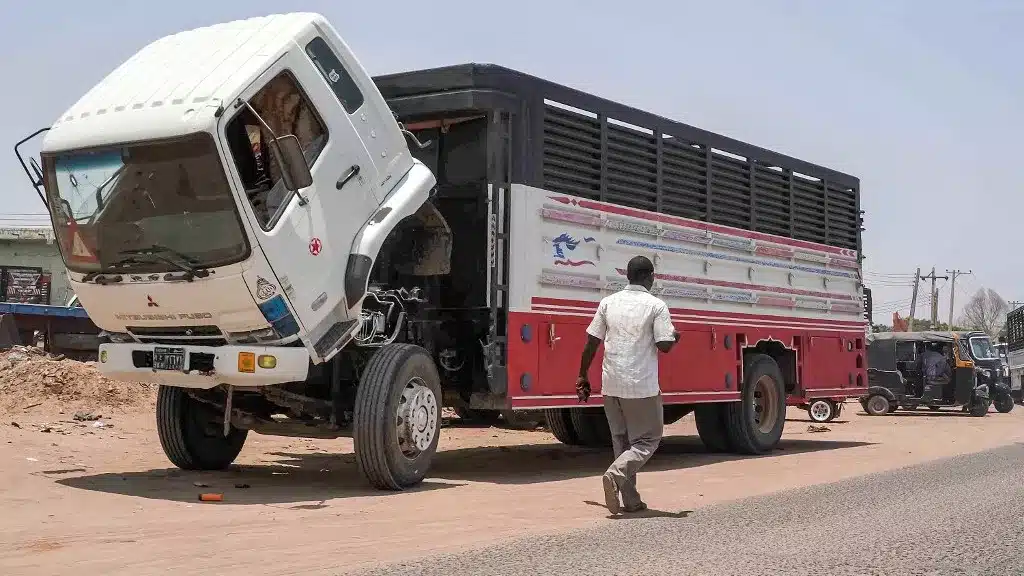Mahanna Abderrahmane used to drive his truck to the Red Sea ports four times per month to load cargo for distribution to Sudan’s many regional states, but since the war tore through his nation, he hasn’t done anything.
He is 200 kilometers south of Khartoum‘s capital, in a café near Wad Madani, where he is enjoying coffee and hookah after hookah.
A truck driver for 20 years, he told AFP he had “never seen anything like this”. “I haven’t made a single load in three weeks”, he says.
And he’s far from the only one. All around, hundreds of trucks are parked and their drivers are trying to kill time. Some are playing cards, while others are recommending a cup of tea or coffee to the women who run the small roadside cafés in al-Jazira state, which has probably received the most displaced people from the war.
Since Khartoum was bombed, more than one and a half million people have fled the capital. The easiest destination for most of them has been due south, towards Wad Madani and its vast fertile expanses wedged between the Blue and White Niles.
According to the Sudanese Chamber of Transport, since the army led by General Abdel Fattah al-Burhane and the Rapid Support Forces (RSF) of General Mohamed Hamdane Daglo went to war on 15 April, 90% of road transport traffic has disappeared.
According to the Sudan Ports Authority, total exports since January have peaked at 282 million dollars, compared with 2.5 billion dollars in the first half of 2021.
– Khartoum inaccessible –
Mohammed al-Tijani, who is also a truck driver, has suffered the combined effects of the war and soaring prices.
Since the start of the conflict, “our journeys to the ports have been extended by at least 400 km”, says this man in his fifties, because he now has to bypass Khartoum under a deluge of fire from artillery and fighter planes and checkpoints manned by the various forces deployed.
And at the same time, the price of petrol – if there is any at the pumps – has increased twenty-fold.
Supplies of goods for export have virtually come to a halt: most factories, mainly in Khartoum, have been shelled and storage silos looted.
Passenger coaches have also stopped reaching the capital.
However, as driver Hussein Abdelqader told AFP, “70% of journeys were to and from Khartoum”. “Today, we only travel between the country’s other cities, so we have far fewer journeys.
Moataz Omar has managed to maintain a certain level of activity, as he used to make the 1,000 km journey between Khartoum and the Egyptian border before the war.
For several weeks, he transported hundreds of fleeing families, who preferred exile to being trapped by the fighting.
“But when the fighting became more intense in Khartoum, it became impossible to get in,” he says.
So we had to bypass the capital, but the highly centralised road network meant that journeys between states took longer and longer.
– No pay –
“Now we travel 2,600 km (…). We have to go through the east: the Red Sea state, then the states of Kassala, Gedaref”, in the south-east bordering Ethiopia, “then al-Jazira” further north, forming a long loop, explains Mr Omar.
Passengers are therefore becoming scarce: “sometimes I wait two days before I have people who want to go from Wad Madani to Kassala or Gedaref or even Damazine, in the state of Blue Nile”, which borders Ethiopia, he continues.
“We’re really afraid of losing everything,” laments Mr Tijani, “because our companies won’t pay us if they don’t have any money coming in.
There used to be an alternative to buses: the train. But on 15 April, as the first shots rang out in Khartoum, the trains from Atbara, further north, or from Wad Madani, turned back. Since then, they have not left their stations.
As for the freight wagons, they too have come to a standstill.
Before, they all converged on Khartoum and especially its industrial suburb, Khartoum-North,” says a railway employee.
Today, Khartoum-North is a ghost town with no water or electricity.
And most of its inhabitants miss it. To Wad Madani or Egypt.


